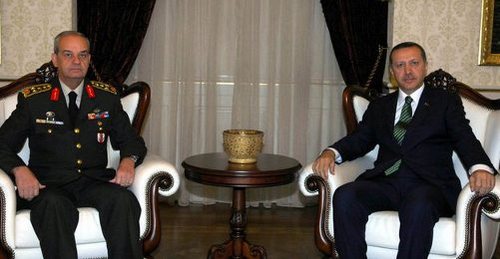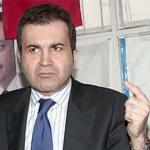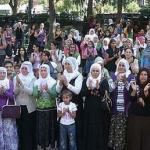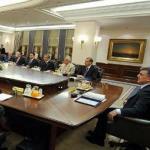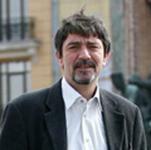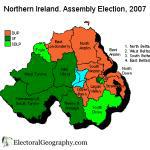On 25 August, Chief of General Staff İlker Başbuğ published a message on the army's website, ostensibly on the occasion of "National Victory Week".
In the message he reiterated military commitment to a unitary structure of the Turkish State and determination to continue the anti-terrorist struggle.
However, the message also referred to the army's respect for "cultural difference", as long as this difference was not used for politics.
Military has two aims
Assist. Prof. Dr. Vahap Coşkun of Dicle University in Diyarbakır has criticised the message, saying that it had two intentions: one was to limit the discussion of a solution to the Kurdish question, and the second was to safeguard the public's awareness of the presence of the army.
The academic said, "Those who carry arms have no right to dictate who discusses what and how. That obstructs the democratic process."
Politicians still use language of war
He expressed his disbelief at the fact that the main opposition parties, the Republican People's Party (CHP) and the Nationalist Movement Party (MHP) are keen to see the military involved in politics at any price.
He also told bianet that the ruling Justice and Development Party (AKP) had made a most unfortunate statement when deputy chair of the parliamentary group, Bekir Bozdağ, mentioned the death penalty in relation to imprisoned PKK leader Abdullah Öcalan when replying to the MHP: "If the government really wants democracy, it mustrefrain from the language of war."
The academic said that the future would show whether the CHP would change its attitude and speak with the government, and what the PKK would do after its announced end of its unilateral ceasefire on 1 September.
Coşkun, who is the author of two books entitled "The problem of transforming the nation state" and "Human rights: an analysis from a liberal perspective", adds the following comments:
Avoid language of war: What Bozdağ said does not represent a language of peace. Criticising the MHP for not having executed Öcalan (by voting for the abolition of the death penalty in the coalition government of the time) cannot bring real peace. The language of the MHP is extremely nationalist and ostracising, it is a language of war. If the government really wants to become more democratic, it cannot use that kind of language.
Military and politics: We have the pitiful situation that politicians adore military intervention in politics. The MHP and the CHP act like that. For the first time, the MHP has really opposed the army, accusing it of "treacherous tendencies". The CHP is also warning the army not to participate in the process.
The military then makes a statement speaking of its "support for the nation state". Even if the opposition uses such a language, it is not right for the army to make statements in the political arena in a democracy. If there is anyone who should make statements, it is the Prime Minister. It is shocking that some political actors are more militant than those in the military, and that they are using a language of war.
Military should remain silent: Democracy involves open-ended negotiations. This means that everyone who feels part of the issue can express their thoughts freely, without fear. It is undemocratic to say 'this cannot be thought or talked about' in advance.
There was nothing surprising in the statement by the General Staff, Başbuğ says these kind of things continuously. The aim was to protect the army's image in public: 'We are part of the process, but we will not make concessions on the unitary structure, be sure of that'. However, this is extremely problematic for a development of debate.
Everyone must watch what they are saying at this stage, and the army must not talk at all. [...]
No going back: The AKP has realised that the Kurdish question cannot be solved as a security issue and has said so. It is trying to gain the support of the public, that is what the meetings of the Minister of the Interior are about. This is the correct method to use. In all the countries with similar problems public support has been vital.
It would be difficult for the AKP to step back from the process, and it would pay a heavy price politically. It has made both its own voters and the Kurdish public hopeful. It has met with the Democratic Society Party (DTP) and has committed itself more than ever before.
Two important issues: I believe that the most basic issues for a solution are the democratisation of Turkey and the disarmament of the PKK.
CHP-AKP: I think there may at least be a meeting between the CHP and the AKP. The MHP is presenting a united front to the public, so that no views apart from that of party leader Devlet Bahçeli is emerging. However, there are parts of the CHP that are saying that the party has a historical duty to solve the Kurdish question and that they will not stand by, like Istanbul party chair Gürsel Tekin and Eşref Erdem. In the east and southeast of the country, the party is facing serious internal opposition from province organisations. [...] Now that the National Security Council has encouraged the initiative, it will be difficult for the CHP to maintain its absolute opposition.
Importance of ceasefire: There are other actors, too. The PKK has announced a unilateral ceasefire until 1 September. What happens afterwards will determine the fate of the initiative. If fighting is not resumed, we may be optimistic. If there is renewed fighting, there may be chaos. (TK/AG)





